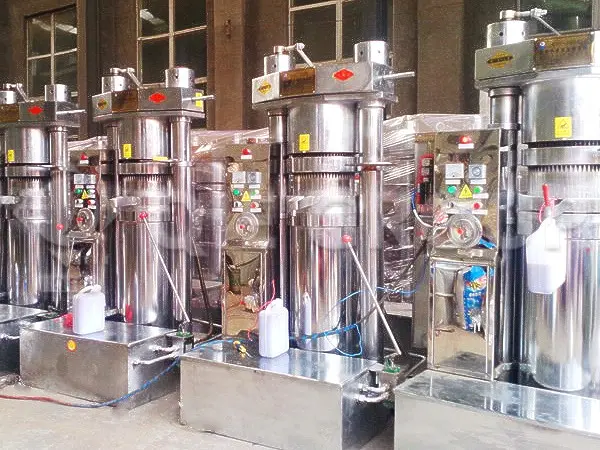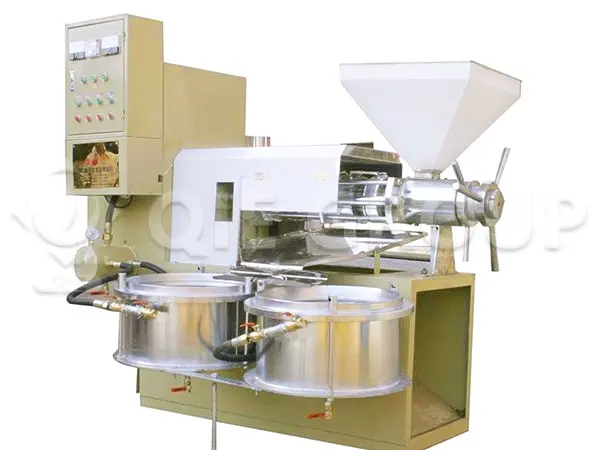With healthy eating becoming an increasingly mainstream trend, more and more consumers are paying attention to the processing details behind cooking oils. While traditional hot pressing is highly efficient, the high temperatures can destroy the precious active nutrients in the oil. Cold pressing technology—a physical pressing method at temperatures below 60°C—is gradually entering high-end kitchens and food processing plants, becoming the new standard for healthy oils.
Cold pressing refers to the process of extracting oil from oilseeds using physical mechanical pressure at temperatures below 60°C. Unlike traditional hot pressing, cold pressing avoids the damage to the oil's molecular structure caused by high temperatures, thus preserving the natural nutrients and aroma of the oilseeds to the greatest extent possible.
1️⃣ Retains natural nutrients
The cold pressing process does not generate high temperatures, which can effectively protect active substances such as vitamin E, phytosterols, and polyphenolic antioxidants, thereby enhancing the nutritional value and health benefits of the oil.
2️⃣ Maintain the original flavor and color
Cold-pressed oils, which are not subjected to high-temperature roasting or bleaching, can showcase the natural aroma and color of the raw materials, such as the mellow fragrance of sesame oil, the light aroma of walnut oil, and the sweetness of camellia oil, making them highly favored by the high-end consumer market.
3️⃣ No chemical residue, safer and healthier
Cold pressing uses a purely physical method of oil extraction, without the need for solvent leaching or chemical refining, thus avoiding residues of hexane, phosphoric acid, caustic soda, etc., and meeting organic and green food standards.
4️⃣ High product added value and strong market competitiveness
Cold-pressed oils, due to their "natural, healthy, and high-end" characteristics, have a higher market premium and a shorter investment return cycle, making them suitable for small and medium-sized oil mills and the branding of specialty oil products.
Want to understand the differences between various pressing methods in production? 🔗 Recommended reading: [ What are the differences between screw oil presses and hydraulic oil presses? ]

Raw materials (such as sesame seeds and walnuts) need to undergo impurity removal, stone removal, and shelling to ensure that the materials are clean, dry, and have uniform particle size. Impurities can affect the oil yield and may even cause equipment wear or off-flavors in the oil.
Cold press oil presses use a screw or hydraulic system to apply pressure, physically squeezing oil from cells. The pressing temperature is maintained between 40–60°C to prevent nutrient loss. Our cold press oil presses employ an intelligent temperature control system and variable frequency speed control technology to ensure stable oil production throughout the year.
Crude oil contains a small amount of cake residue and suspended solids, requiring purification through centrifugation or plate and frame filtration. Our automatic positive pressure filtration system can quickly remove impurities, yielding clear, impurity-free virgin oil that meets primary edible oil standards.
Filtered cold-pressed oil should be stored away from light and at low temperatures. It is recommended to use stainless steel storage tanks filled with nitrogen for protection against oxidation and rancidity. The bottling process must be carried out in a clean environment to ensure hygiene and safety.
Studies have shown that cold-pressed oil can achieve an oil yield of 90%-95% of that of hot-pressed oil, while its nutritional value is more than 30% higher, making it especially suitable for consumers who pursue the concept of "non-chemical extraction".
Many companies believe that cold pressing yields a low oil yield, but in fact, by optimizing equipment and control parameters, the oil yield of cold-pressed oil can be close to that of hot pressing.
Key control points include:
The raw materials are moderately crushed to avoid excessive cell damage that could lead to oil emulsification;
Adjust the pressing pressure and speed to prevent excessive temperature rise or poor slag discharge;
By employing a two-stage pressing process, the residual oil content can be reduced from 12–20% to below 5%.
The use of food-grade stainless steel and a fully enclosed structure reduces oxidative contamination.
| Comparison Dimensions | Cold-pressed oil | Traditional hot-pressed oil |
|---|---|---|
| Temperature control | ≤60°C | ≥120°C |
| Nutritional retention | High (vitamin E and polyphenol retention rate exceeds 85%) | Low (some nutrients lost by more than 40%) |
| Market price premium | On average, it is 20%-40% higher. | Basic pricing |

With the growth in global consumption of healthy oils, cold-pressed oils are becoming a major trend in the high-end edible oil market. Consumers are increasingly focusing on product characteristics such as "non-chemical extraction" and "retention of natural nutrients." According to industry research, the cold-pressed oil market maintains an annual growth rate of over 7%. For small and medium-sized oil mills, investing in cold-pressing equipment can not only increase product added value but also allow for rapid entry into the niche market of healthy oils.
Q1: What raw materials are suitable for cold-pressed oil presses?
Suitable for oilseeds with high oil content and high heat sensitivity, such as sesame, walnut, almond, camellia seed, flax seed, grape seed, pumpkin seed, etc.
Q2: How to increase the oil yield of cold-pressed oil?
Select high-efficiency cold-pressing equipment, optimize the moisture content of raw materials, use a secondary pressing process, and maintain good equipment sealing.
Q3: Does cold-pressed oil need to be refined?
If used in high-end food or cosmetics, filtration and dewaxing may be sufficient; if used for high-temperature cooking, light refining is recommended.
Q4: Does QIE Group provide customized cold pressing equipment?
Yes. QIE Group can provide customized cold-pressed oil solutions, from single machines to complete production lines, based on capacity, raw material type, and plant conditions, and offers installation, commissioning, and training services.
Cold pressing oil is not just a process, but also a commitment to health.
Whether you want to upgrade your existing production line or create a healthy oil brand that emphasizes "zero additives and all-natural ingredients," QIE Group can provide you with efficient, energy-saving, and intelligent cold-pressed oil solutions.
📞 Contact us now for personalized equipment selection advice and project quotes, ensuring every drop of your oil is infused with the power of nature and quality.








